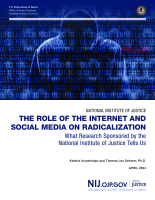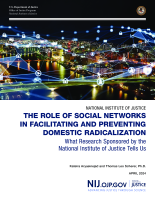Domestic terrorism
Why White Supremacist Women Become Disillusioned, and Why They Leave
Addicted to Hate: Identity Residual Among Former White Supremacists
Social Media and Domestic Radicalization
Choosing Where to Fight: Do Social Networks Distinguish American ISIS Foreign Fighters from ISIS-Inspired Terrorists?
Choosing Where to Fight: Do Social Networks Distinguish American ISIS Foreign Fighters from ISIS-Inspired Terrorists?
Research Rooted in Machine Learning Challenges Conventional Thinking About the Pathways to Violent Extremism
Remarks by the Honorable James K. Stewart to the Third Annual Symposium on Criminal Justice Issues at the University of Illinois on August 24, 1988
Assessing Risk of Terrorist Acts by Looking at Location Data and Demographic and Social Characteristics
Microfabrication process and characteristic testing of a MEMS-based preconcentrator
Military experience, identity discrepancies, and far right terrorism: An exploratory analysis
Why study white supremacist terror? A research note
Military experience, identity discrepancies, and far right terrorism: An exploratory analysis
Why study white supremacist terror? A research note
Social Media and Domestic Radicalization
Social media has become a potent tool for spreading extremist beliefs and promoting violent extremism. NIJ Social Science analyst Aisha Javed Qureshi joins writer-editor Paul Haskins for a conversation about how scientific research is helping law enforcement and other agencies understand and address this growing concern.







